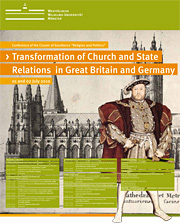Transformation of Church and State Relations in Great Britain and Germany
Conference at the Cluster of Excellence "Religion and Politics"

Even if traditional church and state relations cover a variety of different models ranging from strict separation to cooperation or establishment, it cannot be denied that all of them trace back to Christian perspectives and are influenced by well-known Christian forms of organisation. Muslim immigration, introducing previously unknown forms of organisation and religious practices into Western societies, raises the question of whether traditional church and state relations are also suitable for religious communities other than Christian churches. This institutional perspective must be completed with the individual perspective of the religious adherent who is confronted with the demands of his or her religious community and those of the secular legal order. How do freedom of religion and the principle of non-discrimination operate in a legal order which is characterized by an established church? Are there non-legal approaches which play an important role, too?
The conference aims at comparing the transformation of church and state relations in Great Britain and Germany. These countries are obliged to respect certain legal minimum requirements regarding freedom of religion, non-discrimination and religious neutrality which are partially common European standards stemming from the European Convention on Human Rights and European Community Law; other requirements are based on national law and may vary accordingly. The comparative analysis of the church and state relations in the narrow sense and of the position of the individual adherent promises to reveal different legal instruments of integration as well as the limits of particular forms of cooperation. The historical perspective may allow to understand and to explain differences and similarities.
Conference Venue: Karl-Bender-Saal (room 322, 3rd floor), Juridicum, Universitätsstraße 14-16, 48143 Münster
Programme
Thursday, 1. July
I. Historical Development (Chair: Stefan Korioth, Munich)
| 9:00–09:30 | The Development of Church and State Relations in England, Wales and Scotland | Augur Pearce, Cardiff |
| 9:30–10:00 |
Establishment or De-establishment? The Scandinavian Experience |
Lars Friedner, Uppsala |
| 10:00–10:30 |
Discussion |
II. Interactions between Religious and Secular Law
(Chair:
Fabian Wittreck, Münster)
| 11:00–11:30 |
Legal Protection in Ecclesiastical Courts | Mark Hill, Cardiff |
| 11:30–11:45 |
The German Perspective | Michael Germann, Halle-Wittenberg |
| 11:45–12:30 |
Discussion |
|
| 14:00–14:30 |
Religious Disputes (especially concerning Employment Status) in State Courts in Great Britain | Lucy Vickers, Oxford |
| 14:30–14:45 |
The German Perspective | Hinnerk Wißmann, Bayreuth |
| 14:45–15:30 |
Discussion |
|
| 15:30–16:00 |
Procedural Fairness in Religious Disputes – Requirements under the European Convention on Human Rights | Ian Leigh, Durham |
| 16:00–16:15 |
Comment | Katharina Pabel, Köln |
| 16:15–16:45 |
Discussion |
III. Autonomy
(Chair: Hans Michael Heinig, Göttingen)
| 17:15–17:45 |
Zones of Exclusiveness: Sharia and Halacha vs. the Secular Legal Order? The British Perspective | Javaid Rehman, London Brunel |
| 17:45–18:00 |
The German Perspective | Christoph Möllers, Berlin Humboldt |
| 18:00–18:30 |
Discussion |
Friday, 2. July
| 9:00–09:30 | Autonomy and Established Church – a
Contradiction? |
Peter Edge, Oxford Brookes |
| 9:30–10:00 |
Discussion |
(Chair: Heinrich de Wall, Erlangen)
| 10:00–10:30 | Participation of Religious Communities in Public Life (Schools, Universities, Media) | Peter Cumper, Leicester |
| 10:30–10:45 |
The German Perspective |
Antje von Ungern-Sternberg, Münster |
| 10:45–11:30 |
Discussion |
|
| 12:00–12:30 |
The Legal Status of Muslim Communities in GB |
Julian Rivers, Bristol |
| 12:30–12:45 |
The German Perspective |
Gernot Sydow, Freiburg/Limburg |
| 12:45–13:30 |
Discussion |

